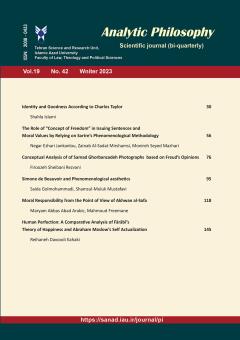-
-
List of Articles
-
Open Access Article
1 - Identity & Good in Charles Taylor's view
Shahla Eslami -
Open Access Article
2 - Conceptual Analysis of of Samad Ghorbanzadeh Photographs based on Freud's opinions
Firoozeh Sheibani Rezvani -
Open Access Article
3 - The role of "concept of freedom" in issuing sentences and moral values by relying on Sartre's phenomenological methodology.
zeinabsadat mirshamsi Negar Ezharijenekanloo Monireh sayyidmazhari -
Open Access Article
4 - simon de bouvar a phnomenological eastathics
شمس الملوک مصطفوی saeide golmohamadi -
Open Access Article
5 - Moral responsibility from the point of view of Akhwan al-Safa
Maryam abasabadarabi Mahmood farimaneh -
Open Access Article
6 - Human Perfection: A Comparative Analysis of Fārābī’s Theory of Happiness and Abraham Maslow’s Self Actualization
Reihaneh Davoodikahaki
-
The rights to this website are owned by the Raimag Press Management System.
Copyright © 2021-2025







